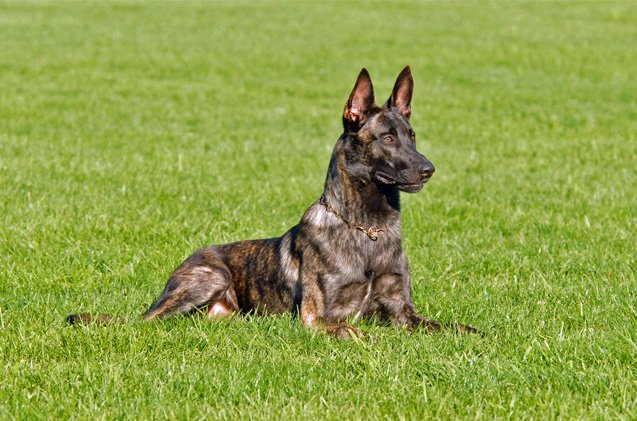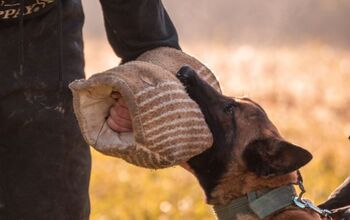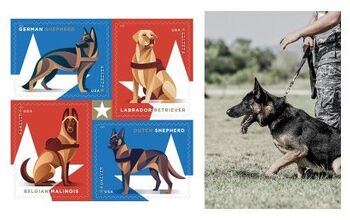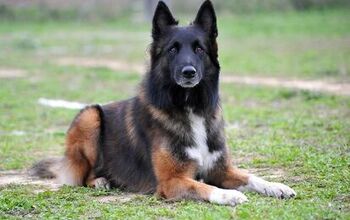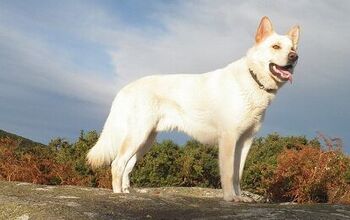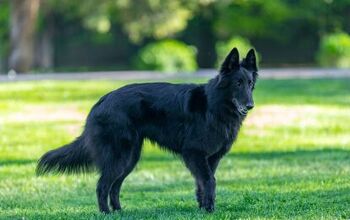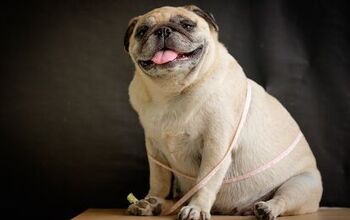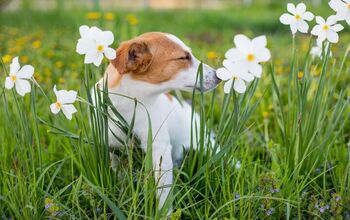Dutch Shepherd


About Dutch Shepherd
Dutch Shepherd Basics
There are so many Shepherds out there to choose from: Dutch, German, Belgian, Dax, and more. All of them have special qualities. While you may be better acquainted with its cousins, the German Shepherd and the Belgian Shepherd, the Dutch Shepherd is an all-around amazing dog that is a great fit for any active family (this pup will tucker you all out!). With three types to choose from (longhair, shorthair and wirehair), the Dutch Shepherd is a rare sight at the dog park. Thankfully, fanciers are working hard to increase its numbers. And it’s a good thing they are: this is a super intelligent dog that owns the ring when it comes to obedience competitions, guard duty, and field/agility trailing. While the Dutch might not be the most popular Shepherd yet, that will change. People are only just starting to realize what a special pooch this guy truly is!
Even though the Dutch Shepherd made its debut on the farm, this breed now makes a wonderful companion for your family. Obedient and smart, this dog is a pleasure to train and will watch over your family. And because he’s loving and playful, kids will always have a pal to play with. He will fit in well to just about every home, provided that you have the space and energy necessary to keep him happy! If you have been considering bringing a Dutch Shepherd into your home, you’ve come to the right place! Keep your eyes on this page. We’re about to break down everything that you need to now about this special doggo.
Even though the Dutch Shepherd made its debut on the farm, this breed now makes a wonderful companion for your family.
Origin
Hailing from The Netherlands, the Dutch Shepherd was traditionally used as a shepherd’s dog in the countryside. They would watch over flocks of sheep, keeping them in line and warding off any potential threats.. Not only did they have to guard them, these dogs also had to keep the sheep away from crops by patrolling the borders of the road and the fields. On top of all of that, Dutch Shepherds accompanied sheep as they made their way to common meadows, markets, and ports. These were highly trained (and highly useful) working dogs that proved to be quite popular for obvious reasons.
The Dutch Shepherd was a jack-of-all-trades on the farm, which made him indispensable to farmers. They would keep the hens away from the kitchen garden, herd cows for milking, and pull the milk carts. This breed remains an excellent watch and guard dog to this day, as they alerted farmers to strangers for generations. By the 1900s, sheep flocks had all but disappeared in The Netherlands, so the Dutch Shepherd was no longer needed on the farm. However, this breed is now being used as a police dog, as a search and tracking dog, and as a guide dog for the blind. This is a highly trainable pooch who loves to serve.
Sadly, the breed’s numbers have dwindled and it is not as popular as the Belgian Shepherd or German Shepherd in North America. Even in The Netherlands, the Dutch Shepherds are rare and the wire-haired variety is few and far between. Hopefully this will change because these are remarkable animals who deserve more happy homes.
Pedigree
Sharing a similar standard to Belgian and German Shepherds, the Dutch Shepherd’s origin can be traced to the same continental herding dogs. However, they are not a breed that was intentionally developed at first – they are a natural land-breed that came to be in late 19th century Holland. They’ve quickly proved to be indispensable at farms, with their impressive work ethic and versatile character, so people started breeding them selectively in no time.
The first breed standard for the Dutch Shepherd dates from June 12, 1898. This is when some general characteristics of the breed started to be determined, but throughout the years, the standard for these dogs went through many changes. For instance, in the original standard, any coat color was permitted, but by 1914, only brindle coats were accepted, as this was the only trait that could make them differ from similar shepherd breeds they share ancestors with. This standard remains even today, and the desirable traits of the breed were further crystallized.
Now, a Dutch Shepherd with a pedigree will be a medium-sized, well-muscled dog that carries himself naturally but is always alert. They can have 3 types of coat – short, long or rough-haired – but the color is always brindle, with gold or silver undertones. Males stand at 22 to 25 inches, and the females are slightly smaller, and their body shape is balanced, with the head proportionate to their powerful bodies. Overall, a Dutch Shepherd will look powerful and strong – just like he is.
Food / Diet
Every dog depends on their diet to stay healthy and energized for their daily activities, but working breeds such as the Dutch Shepherd are even more so dependent on their food source to stay in top form. These energetic and large dogs need a well-balanced, nutritious diet to support their overall health. A specific ratio of meat-based protein, healthy fats, and complex carbs is the magic formula, especially when fortified with essential minerals and vitamins. In most cases, all of these nutrients can be found in high-quality dry food for dogs. The Dutch Shepherd will do well on a diet of premium kibble, as long as it is made from high-grade materials and meets their unique needs. In other words, choose kibble that is suitable for their age (puppy, adult, or senior) and their size and activity level. High-quality dry food for large and athletic dogs is usually a good match. Of course, don’t go just by that label – always check the back for the ingredient list to determine if the food really lives up to the hype. The first ingredient should always be real meat, preferable from a single source of protein, followed by other natural, wholesome ingredients that provide all of the essential macro and micro-nutrients for your pet. Avoid foods that use cheap fillers such as wheat, corn, or soy, artificial colors, flavors, and preservatives, as well as unhealthy ingredients that could harm your pooch in the long run, such as corn syrup, melamine, BHA, and so on.
To prevent bloat, split their recommended daily serving of kibble into two separate meals. If they still eat too fast even with smaller servings, consider a slow feeder that will force them to eat at a healthy pace and improve their digestion. Similarly, it pays off to pay attention to the amount of the food you’re serving and not just the quality of it – you don’t want to overindulge your Dutch Shepherd as it can reflect poorly on their health. Overeating leads to obesity which causes a myriad of health issues, such as diabetes or joint pain.
As always, if you are ever uncertain about your Dutch Shepard’s diet, you should consult a veterinarian. Dog food manufacturers can only provide general guidelines and since every pooch is different, these guidelines aren’t always perfect. Only your vet can judge the best possible diet for your specific pooch. So feel free to ask them about this at your next check up. That’s why you have a vet after all. Don’t be afraid to use them!
The Dutch Shepherd is a pleasure to train.
Training
The Dutch Shepherd is a pleasure to train. This breed is intelligent and naturally trainable. In fact, it is believed to be the most competent of all shepherd dogs, especially when it comes to agility, obedience competitions, guard duty, herding, and field trailing. This also makes the breed a great choice for service duty, police work, and search and rescue training. The Dutch Shepherd might not be the most popular Shepherd out there, but that doesn’t mean they aren’t the best!
Because this breed is so smart, it’s important to establish your role as the pack leader. With dogs that are this intelligent, a stubborn streak is a common occurrence. However, a little patience and the right training approach should ensure that this won’t be an issue. Your Dutch Shepherd must learn his place within the family unit. Of course, taking a stance as the pack leader doesn’t mean you have to be harsh or cruel- simply maintain a confident and firm attitude. Rely on positive reinforcement tactics instead of aversive methods (which are closer to abuse than training) and you’ll be set for success. Using rewards to motivate a smart dog always works, and once your Dutchie figures out that doing something gets them a treat and praise, you can count on them wanting to what they’re told. Stick with it and you’ll be amazed what you can train your Dutch Shepherd to do. These doggos live to work and please their owners. You will have so much funny discovering what they are capable of, along with your entire family.
Weight
The Dutch Shepherd weighs between 50 and 70 pounds.
Temperament / Behavior
Reliable, alert, intelligent, and intuitive, the Dutch Shepherd is loyal to his family. Their devotion to their owners, as well as their alertness, are what makes these dogs such great watchdogs and guard dogs. The Dutch Shepherd will protect what is his and make sure you know if someone is intruding (especially if your pup is specially trained to behave like this). Yet, while they do excel as guard dogs (and working dogs in a variety of roles), these shepherds also make fantastic family pets. You’ll find this dog to be affectionate, happy and obedient (if trained, of course). That’s a wonderful combination to have in any dog and they will light up any home. As soon as they’re done with adventuring for the day, your Dutch Shepherd will happily curl up under your feet or ask to get some ear scratches and cuddles. If there are older children in the home, they’ll love playing with their new pet. As long as they’re big enough not to be knocked over and respectful towards dogs, the Dutch Shepherd will love to be their playmate. This is a pup who will bond with his fam for life and you’ll quickly feel the same way about him too!
One of the most impressive traits of these shepherds is their human-like intelligence. In fact, some experts claim that they’re among the smartest shepherd breeds. Considering the prestigious canine competition, that’s saying a lot. To be happy, the Dutch Shepherd needs plenty of physical and mental stimulation. This is an independent breed, so the Dutch Shepherd can have a will of its own. But most of all, this dog loves attention and loves to learn. As long as you keep your Dutch Shepherd stimulated, he will keep your whole family happy.
Common Health Problems
The Dutch Shepherd boasts no serious physical or mental hereditary illnesses.There have been some reports of hip dysplasia, but these instances are quite low.
Buying a puppy from OFA certified parents (both hips and elbows) greatly diminishes the risk of dysplasia. OFA results for certified dysplasia-free Dutch Shepherds can viewed at the Orthopedic Foundation for Animals website.
As always, it’s important to maintain regular checkups with your vet to ensure that any health issues can be spotted and treated early and effectively.
Life Expectancy
The Dutch Shepherd has an average lifespan of 13 to 15 years.
Exercise Requirements
An excellent all-round utility dog, the Dutch Shepherd excels at agility, obedience competitions, guard work, herding, and field trailing. You need to be active to keep up with this dog. Daily exercise is a necessity. Make sure to take your dog out for lots of walks, runs, hikes, or bike rides. You should have a yard, so your dog can run around on his own. This is not an animal that will do well in an apartment building. He needs plenty of space, fresh air, and exercise to live his best and happiest life. If your Dutch Shepherd doesn’t get the activity he needs, he will find his own amusement. This includes destroying your possessions. He needs to work, both mentally and physically. Otherwise, things could get ugly. You’ve been warned!
Reliable, alert, intelligent, and intuitive, the Dutch Shepherd is loyal to his family.
AKC
The American Kennel Club advanced this breed from their Foundation Stock Service program to Miscellaneous Class, as their numbers and popularity in the United States note significant growth. However, they’re still not officially recognized by this canine club- that’s the next step, and hopefully one that the organization will take soon.
The AKC, however, holds this breed in high esteem- here’s what they have to say about these Netherland natives: “ The Dutch Shepherd is a lively, athletic, alert and intelligent breed, and has retained its herding instinct for which it was originally developed. Having an independent nature, it can be slightly obstinate and have a mind of its own.”
Coat
There are three different types of Dutch Shepherd coats. These are shorthair (quite hard, not too short); wirehair (curly, medium length hair that’s dense harsh and tousled); and longhair (long, straight, flat and harsh). With all coat types, the color remains the same: various brindles in all shades of gold and silver. Golden can vary from light sand to chestnut red.
Puppies
Socialization should start at an early age for the Dutch Shepherd. As well, obedience training should start as soon as possible to establish your role as the pack leader. While the Dutch Shepard is renowned as a working dog and beloved as a pet, they still need to be raised right. Training and socializing your pup early is absolutely vital to ensure a long and loving relationship. So don’t delay at training your Dutch Shepard or at least sign them up for training classes.
Dutch Shepherd Frequently Asked Questions
Are Dutch Shepherds aggressive?
Dutch Shepherds are protective by nature but they are not an aggressive breed: however, if you neglect to train and properly socialize your dog, they can develop different behavioral issues, including resource guarding and aggression. That is why it is crucial to start proper training and socialization while your pet is still a puppy – that’s when they are most likely to soak all that information up! Introduce them to new friendly dogs, to kids and new people as these experiences will help to create a healthy and happy adult dog. Otherwise, you risk seeing your pet become frightened, aloof, and aggressive, and for a breed as powerful and large as the Dutch Shepherd, this is never good.
How much do Dutch Shepherds cost?
In case you’re buying a Dutch Shepherd puppy as a pet from a reputable breeder, you can expect to pay anywhere from $1,000 to $2,000. However, if you want a puppy with an impressive lineage that boasts an enviable pedigree, the prices go much higher, ranging from $3,000 to $7,000. Of course, this can be considered a much higher price than some other breeds, but considering the wonderful traits and aspects of the breed, and their powerful looks, the price is not difficult to justify, especially when considering the work that goes into rearing a healthy puppy. Still, it would be ideal to adopt whenever it is possible. Whether or not you can find a Dutch Shepherd that is up for adoption is unknown, but if the chance appears – it is much better than buying!
What’s the difference between a Dutch Shepherd and a German Shepherd?
Dutch Shepherd and German Shepherd don’t just look a little bit different, but they also have different characters. Over the years, German Shepherds have been bred more as family pets than working dogs, which isn’t the case with agile Dutch Shepherd – and as a result, Dutch Shepherds are more energetic and active, and will require more exercise to stay happy and healthy. And while the German Shepherd gained a bit of a goofy and inquisitive character trait over the years, the Dutch Shepherd retains that characteristic “edge”. This means that they have more acute senses, a heightened loyalty trait, and a bit more energy too. Of course, the biggest difference is the looks, as the Dutch Shepherd gained a much more unique appearance due to their parentage.
How long do Dutch shepherds live?
The average life expectancy for a Dutch Shepherd is 13 to 15 years. Considering that the maximum life expectancy for most dog breeds is around 15 years, it’s safe to say that the Dutch Shepherd are long-lived dogs. If you are looking for a loving and reliable four legged friend and a companion dog to spend many years with, this breed is an easy choice: they are protective, smart, and affectionate – and that’s all that you can want from a good doggo friend.
Do Dutch Shepherds shed a lot?
Dutch Shepherds have a few coat varieties, but all of them have undercoats, which means shedding is inevitable. These dogs are considered to be moderate shedders, but will blow coats seasonally (twice a year) when they will shed more than usual – if you are looking for a hypoallergenic dog or dread pet hair on your furniture, Dutch Shepherd is not the dog for you.
Still, these dogs don’t shed excessively all year long, and fit in the group of normal, average shedding dogs. Of course, this requires a bit of work on your part: brush their coat at least once per week and several times per week when they are shedding their coats seasonally. If you wish, you can take your pet to the specialized dog grooming salon at least once a month as this can help you maintain their looks and hygiene, and save you from loose hair all over your home, clothes, and possessions.
Do Dutch Shepherds smell?
As a breed, Dutch Shepherds are not considered to be smelly dogs. Of course, it will all depend on your pet’s hygiene – if you don’t bathe them, fail to keep their teeth clean, or let them roll around in dirt, they will be stinky for sure. As you can see, it all depends on you! Every dog breed relies heavily on the owner, and the Dutch Shepherd is no exception – if it was up to them, they’d be as stinky as possible. They’re dogs, after all! But it is up to you to maintain proper hygiene: make sure their daily habits are not disgusting (eating poop and rummaging in dirty places), and that they are regularly washed and clean. And with that, you will surely have a normal, healthy, and pleasantly smelling doggo in your home!
Photo credit: Larry Pickett; Carole Field/Dutch Shepherd Dog Club of America

Amy Tokic, Editor of PetGuide.com, is a passionate animal lover and proud pet parent of Oscar, a Shih Tzu/Chihuahua cross, and Zed, a Japanese Chin. Her love of animals began in kindergarten, when she brought her stuffed dog Snoopy into class with her every day. Now, she writes about her adventures in pet ownership and tirelessly researches products, news and health related issues she can share with other animal enthusiasts. In her free time, Amy loves perusing used book and record stores, obsessing over the latest pet products available and chasing squirrels with wild abandon (a habit attributed to spending too much time with her pooches).
More by Amy Tokic



